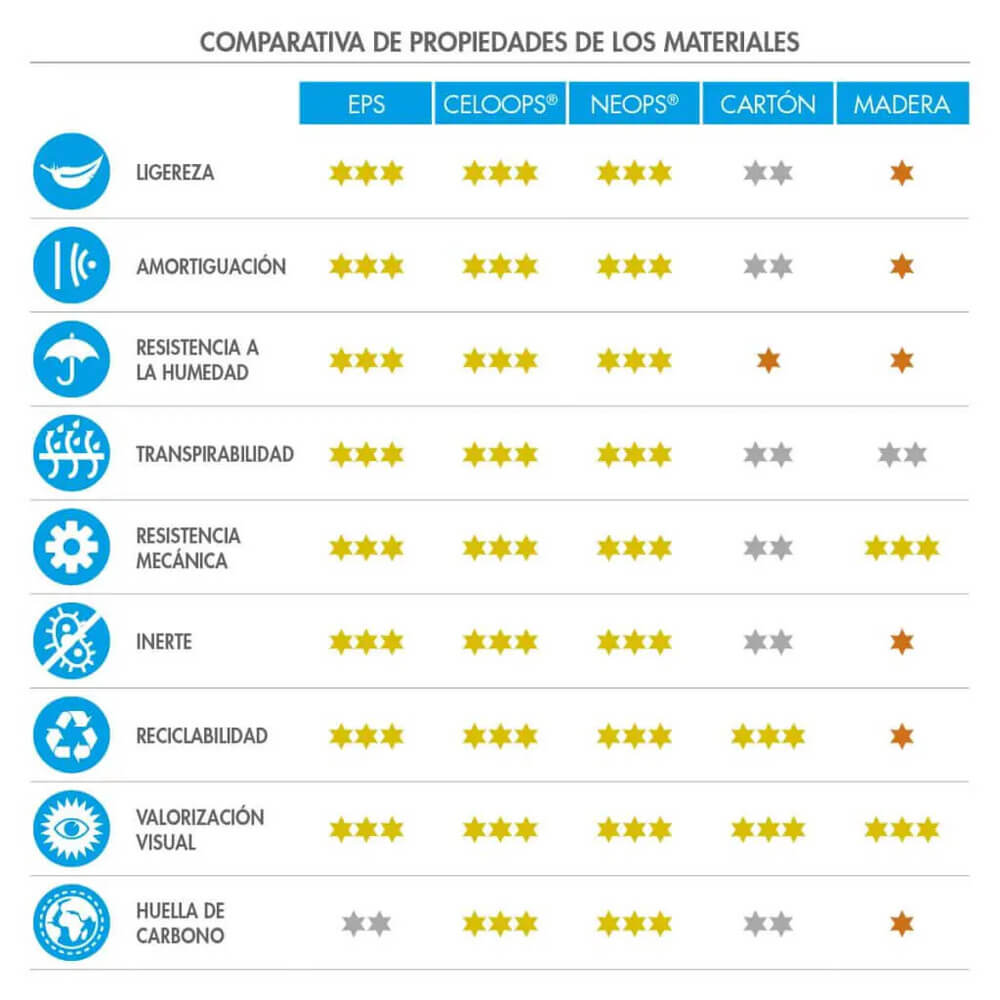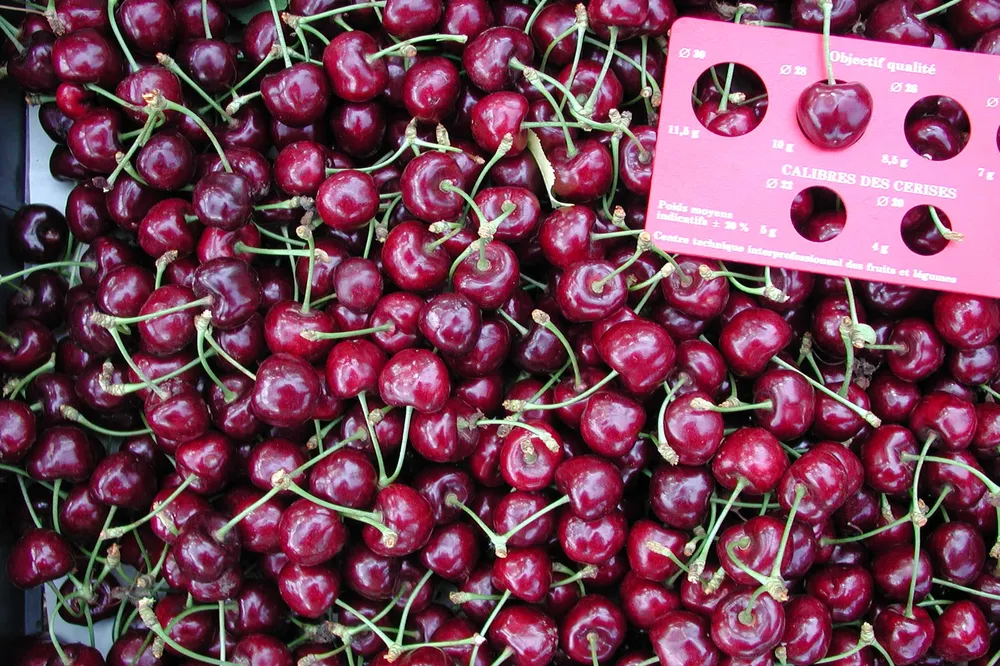We eat with our eyes. But we also choose what we eat based on the appearance of the food at the point of sale. What if we told you that we have packaging that extends the shelf life of fruit and also improves its presentation and gives you access to a premium customer? Discover the cherry packaging from Knauf Industries that is revolutionising the market.
Logistics and transport of cherries. Fundamental challenges
Cherries are a clearly seasonal product with a medium-high positioning in terms of price range. Their weakness is their high perishability. To avoid shrinkage and achieve an unbeatable presentation at the point of sale, advanced post-harvest preservation technologies and innovative packaging solutions are applied.
In this post, we will discuss these solutions for cherry growers.
Post-harvest technology solutions for cherries
The aesthetic component of cherries is a decisive purchasing factor. The customer expects a smooth, juicy fruit with a subtly shiny skin and no bruises. If we want to avoid premature deterioration of the fruit, post-harvest care must be utmost.
This care begins in the fruit and vegetable shop and continues with the latest innovations in the transport and packaging of cherries.
Hydrocooling
To prevent the fruit from overheating or dehydrating immediately after harvesting, hydrocooling (rapid cooling without dehydration) is used to lower the temperature to about 0.5-4 degrees °C. This preserves the turgid texture and shine of the tree without resorting to other chemicals.
The challenge of efficient logistics for cherry growers is to preserve this low temperature during transport.
Refrigerated transport
If cherries are such a highly perishable and delicate fruit, why are cherries not always transported and packed in refrigerated transport? The answer is simple: refrigerated logistics for delicate fruit is more expensive and efficient and less expensive alternatives exist.
Improvements in the transport of perishable products include the use of isothermal boxes (also known as 'thermal boxes' for transporting cherries). They preserve the cold and maintain the temperature after hydro-linking, avoiding sudden changes that could damage the product, from the warehouse of departure to the point of sale.
Isothermal boxes for fruit: EPS, NEOPS® and CELOOPS®.
Isothermal packaging has a dual function: to preserve the inside of the fruit at a cold temperature and to maintain stable moisture levels. Knauf Industries produces cherry packaging with three material alternatives. In this way, they meet the needs and budgets of different producer profiles. These three materials are expanded polystyrene (EPS), CELOOPS® and NEOPS®.
Below we explain the main differences between these materials. In line with our commitment to circularity, Knauf Industries has developed two circular and alternative materials to EPS: CELOOPS® and NEOPS®.
EPS packaging for fruit
EPS boxes are already widely used for other fruit and vegetable products such as broccoli, plums or lettuce.
Our customers who have already incorporated these innovations for the transport of fruit destined for the cherry trade highlight these qualities, among others:
- Insulation. EPS is an excellent thermal insulator due to its physical structure (expanded beads, 2% raw material and 98% air). Cherries are packed in the cold, and EPS is one of the materials that best maintains this temperature during shipping. Cold does not escape and external heat does not penetrate easily.
- Mechanical resistance. It protects against shocks and vibrations and does not break easily. It is the perfect ally against bumps or knocks when loading the truck. Especially with delicate products such as cherries.
- Lightness. The boxes weigh less, are easier to handle during loading and unloading and reduce transport costs.
- Breathable. Natural excess moisture from the fruit and residual moisture from the cooling process is prevented from condensing. This maintains product quality and prevents premature rotting.
- Inert. Its surface does not allow the proliferation of fungi, one of the worst enemies of post-harvest fruit.
- Presence. The contrast between the white colour of the box and the red of the cherries makes the product clean and enhances it. The thick walls also convey a sense of protection that reinforces the customer's purchasing decision.
- Customisation. The moulding technique makes it possible to produce boxes of various sizes and formats to meet the end customer's requirements (e.g. centenaries, event gifts, etc.). The cherry boxes are produced with cooling water drainage holes at the base. You can opt for standard boxes or, for a larger investment, design a customised solution.
- Recyclable. EPS is easy, convenient and energy efficient to recycle by mechanical means. Three unbeatable arguments for the undecided who still see plastic packaging as an environmental problem.
As can be seen, due to its circular nature and light weight, it can be considered a sustainable packaging for cherries. All the more so as it extends the shelf life of the product, thus reducing food waste in the logistics chain.
CELOOPS®
CELOOPS® is manufactured from post-consumer recycled plastic by chemical processes. It is therefore suitable for contact with food. It has the same properties as EPS, but with a lower carbon footprint.
You can find out more about CELOOPS® by downloading its data sheet.
Being made from recycled material, CELOOPS® cartons are exempt from the plastic tax to the same extent.
Furthermore, they are already in line with the environmental requirements of future European legislation, which will require all packaging to be recyclable. This is why many agri-food companies are opting for CELOOPS®, complying with regulations and aligning themselves with their consumers, who are interested in more sustainable solutions.
NEOPS®
The most innovative circular material.
NEOPS® is an alternative to EPS produced from pruning waste and other non-agricultural vegetable waste. It has the same properties as EPS, but because it is of plant origin and does not come from crude oil, these boxes have a 30% lower carbon footprint (compared to other materials).
It is important to emphasise that this is not biodegradable packaging for fruit, but packaging that, like EPS, is 100% recyclable.
Comparison of different cherry packaging
The arrival of packaging made of EPS, CELOOPS® and NEOPS® represents a quantum leap in innovation in the transport of agricultural products, which until now has been dominated by other traditional materials such as cardboard and wood.

Export advantages with EPS crates
Distribution to international markets requires cherry export packaging solutions that can protect for thousands of kilometres. That is why EPS crates (or their more sustainable alternatives, CELOOPS® and NEOPS®) are the exporter's greatest ally. They meet the high expectations of international customers who are willing to pay more but are very demanding. At the same time, they reassure fruit exporters who know that their product will arrive in perfect condition.
Producers who choose this packaging recognise that EPS cherry boxes sell faster and at a higher price in places like Rungis, the huge Parisian food market, known to the Spanish as 'Mercaparís' (by analogy with Mercamadrid).
Beautiful and elegant: the emotional factor for selling cherries
EPS boxes and their alternatives have become (in the words of those who already use them) a special packaging for quality cherries. The preferred choice for that exceptional quality harvest, which deserves accurate, beautiful and original packaging.
Foam boxes, with their white colour and clean appearance, give a perception of freshness, elegance, design and innovation that differs from the traditional character of other materials. A very relevant factor for younger customers who are keen on new aesthetics.
Naturally, these cherries are sold at a higher price on the market and leave a higher profit margin for the producer.
Sustainability in the cherry market
New generations of university-educated producers, convinced of the circular economy and eco-design, are opting for EPS boxes for cherries and other similar agricultural products. This is why the latest trends in fresh produce logistics opt for packaging solutions with a lower carbon footprint and recyclability, such as CELOOPS® (due to its recycled nature). Even beyond oil, with NEOPS®.
These entrepreneurs are transforming the field and the way such a traditional industry is understood. Many refer to these packages as 'the new smart boxes for fresh cherries': efficient, beautiful and with less environmental impact.
Source: Knauf Industries
Images: Knauf Industries
Cherry Times - All rights reserved











